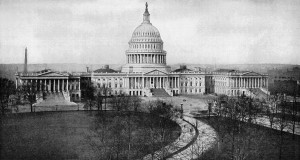From Bench to Policy
by Avital Percher and Devon Collins
Rockefeller attracts people who are passionate about science. It is therefore no surprise that many researchers here move from behind their workbenches to get involved in projects that bring science beyond York Avenue. From art projects to public outreach, these endeavors demonstrate an interest in establishing ties between scientific and public communities. One aspect of this public engagement is science diplomacy, which focuses on the use of diplomatic efforts for the furtherance of science and vice versa (a more detailed description was made in last year’s article1). While science diplomacy might seem an esoteric concept, best left to political science majors and bureaucracy lovers, we posit that the general scientific community’s involvement in this field is critical. Unfortunately, among scientists, the importance of science diplomacy is often poorly appreciated and afforded little priority.
For those who are less familiar with this topic, we strongly encourage taking the Science and Diplomacy class being taught on campus for the past few years (and being taught again this spring through the generosity of the Hurford Foundation). The class goes on for roughly six weeks, and brings in a wide variety of speakers from different fields and organizations. This past year’s roster was particularly noteworthy, and included science diplomacy veterans such as past Secretary of State advisor, Nina Federoff, Nobel Prize winner Peter Agre, and diplomat Thomas Pickering. For the past two years, this class has also culminated in a trip to Washington, D.C., giving participants the chance to interact with representatives of several organizations including the Smithsonian and the National Academies of Science. Of note this year were meetings with David Rejeski, Director of the Science and Technology Innovation Program at the Woodrow Wilson Institute (WWI, a semi-independent think tank), and Margery Blumenthal, Executive Director of the President’s Council of Advisors on Science and Technology. These speakers provided fascinating perspectives on the interests and activities of these organizations, such as a study by the WWI on science information acceptance based on the delivering persona2. Importantly, they also demonstrated that there are alternatives to careers in academia and industry that are still deeply rooted in the life sciences.
Why is this science diplomacy important to the broad spectrum of the scientific community – from graduate students to primary investigators? While not directly relevant to our current research, there are serious long-term implications of our detachment from engaging with policy issues. Topics such as the impediments to scientific funding and the opinions of politicians with influence on legislation make for an increasing likelihood that other parties will be able to better influence critical decisions. Furthermore, pro-science organizations tend to have lesser funding, as well as legal lobbying restrictions due to government support. By allowing the current state to continue, we willfully withdraw our needed contribution from the national dialogue.
A short time after the class trip, the writers of this piece returned to DC for a symposium on Science Diplomacy. It was there that we were once again reminded that, in matters of science policy, Rockefeller walks in the shadow of Dr. Lederberg. As President of the University from 1978-1990, his work went far beyond his seminal contributions to the understanding of bacterial genetics, and included extensive political and policy-based activism, spanning a range of topics including, but not limited to, internet accessibility for scientists in the early 90’s, healthcare reform, and bio-warfare. His tireless work away from his lab bench is demonstrated by the numerous acknowledgements of influence and contributions, and provides a towering benchmark to how the scientific community can extend the impact of its work.
The Rockefeller administration has been making spectacular steps in helping people find alternative careers beyond academia, though if one were to survey the events (e.g., consulting interest group meetings), the focus of possible fields of employment (academia, consulting, industry) and areas of interest, there is a manifest and pervasive gap in the research community’s interest in policy engagement.
Therefore, we propose that Rockefeller take strides to provide training to enable scientists to transition from the bench towards policy-focused positions. One possible route would be to provide brief internship programs of several months for scientists to gain exposure with local or federal agencies, coupled with collaborations with a nearby university for exposure to topics beyond Rockefeller’s expertise such as international affairs, policy making, and economics. There are already a few programs that can provide an example for us to build upon. Georgetown University offers a minor entitled “Science, Technology and International Affairs”, which aims to “provide policymaking training to students who already have a strong math and science background.” MIT has the Science Policy Initiative, which offers a “Graduate Certificate Program in Science Technology and Policy”.
While it is obvious to all here on campus that the science being done at Rockefeller is first-rate and will always be the top priority, it is also known that the current employment opportunities in academia cannot accommodate even our output. Encouraging awareness of and involvement in policy-oriented bodies would enable an increased presence of scientifically trained individuals in government (both domestic and abroad), which could only encourage further support for science research in the long run.
References:
- Ram RR, Olinares PDB. “Think Globally About Science”. The Incubator. 20 October, 2014. http://incubator.rockefeller.edu/thinking-globally-about-science/
- Fiske ST, Dupree C. Gaining trust as well as respect in communicating to motivated audiences about science topics. PNAS. 111:13593-13597


1 thought on “From Bench to Policy”